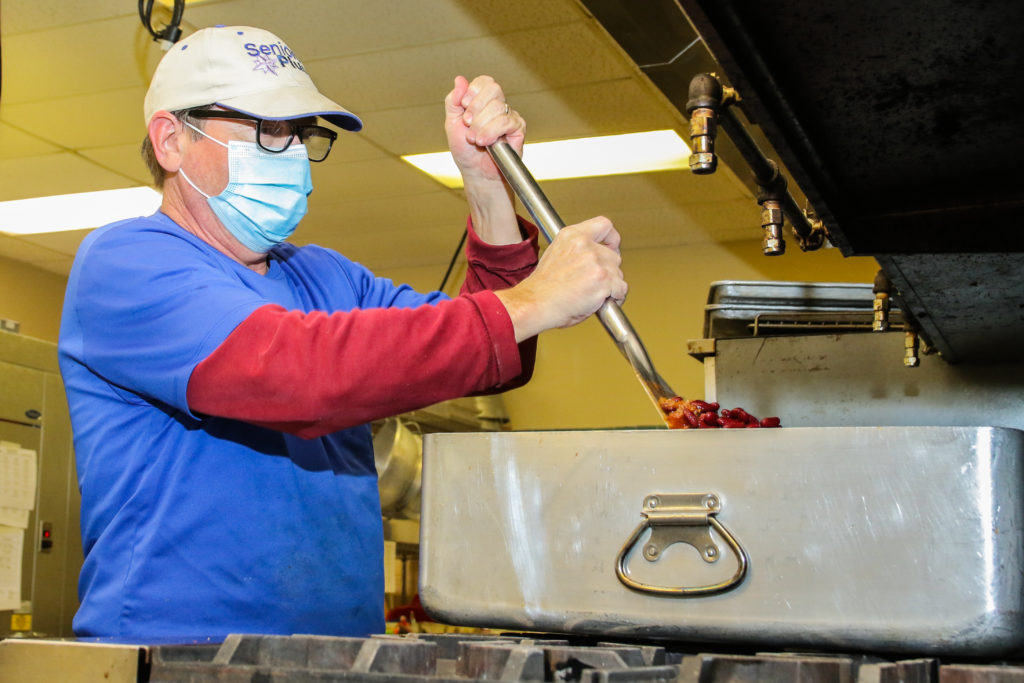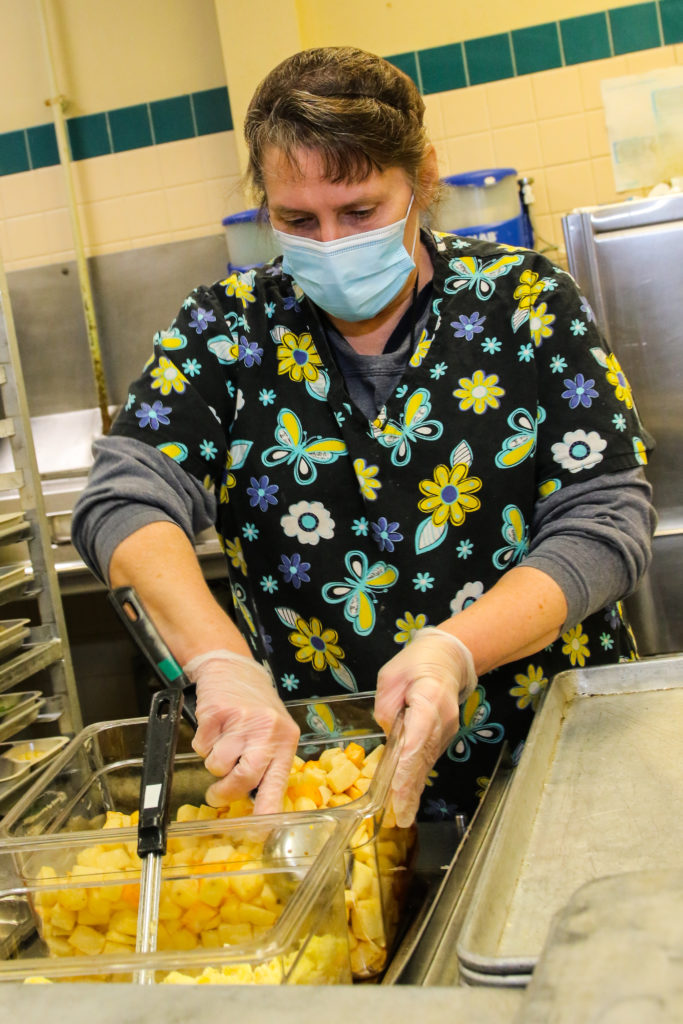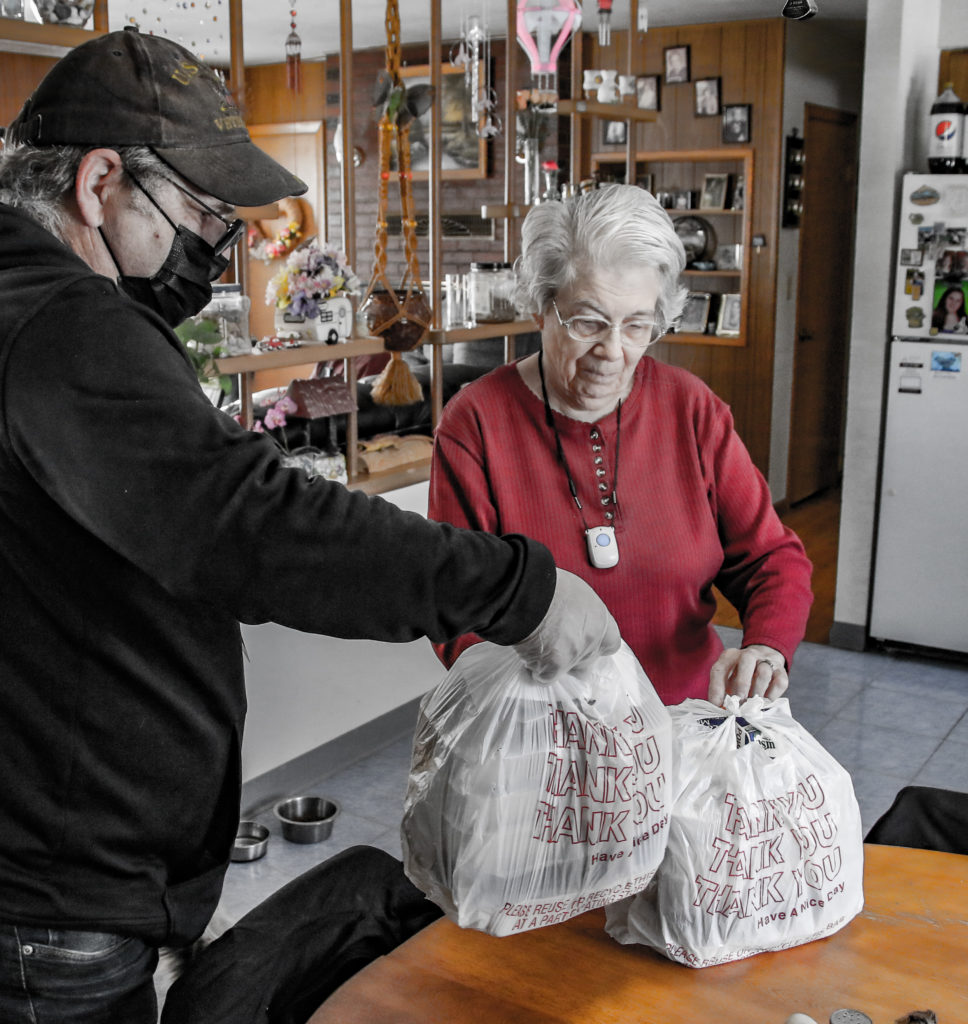SeniorsPlus very busy during pandemic
By Nathan Tsukroff
LEWISTON – The COVID-19 pandemic has phones “ringing off the hook” at SeniorsPlus in Lewiston.
Phone calls to the agency are half-again higher under the pandemic than they were a year ago, jumping from 120,000 a year previously to about 196,000 calls this past year.
SeniorsPlus is the designated Area Agency on Aging for Western Maine, and works to enrich the lives of older people and adults with disabilities. The agency’s goal is to assist adults to remain at home safely for as long as possible.

Much of the agency’s work is concentrated on community services for older and disabled adults in Androscoggin, Franklin, and Oxford counties, but SeniorsPlus is also tasked with providing care coordination for adults all across Maine under a contract with the state.
“That’s why our call volume is so high,” Betsy Sawyer-Manter, President and CEO, said. “People are calling a lot . . . I don’t know if it’s because of the pandemic.” Calls are often direct-dial to one of the 125 staff members, rather than a central switchboard, so callers don’t have to deal with menus.
Calls to the main phone number for SeniorsPlus are returned as quickly as possible by staff, but a return call may not be until the following day, Sawyer-Manter said. Clients will often call back multiple times if they don’t reach someone in person, increasing the perceived volume of calls.
“People are calling for a variety of reasons. Right now, the two hot topics are, ‘Where’s my stimulus payment?’, and ‘Where am I going to get the vaccine?’, she said. “So some of our calls are sort of driven by the news cycle.”
SeniorsPlus just finished assisting older adults with the Medicare open enrollment, which led to a lot of phone calls. And the agency continues to help adults with questions about Medicare throughout the year, Sawyer-Manter said.
SeniorsPlus has four main phone numbers for adults to call for different topics. “So somebody can call about Medicare. We have a Medicare hotline. So people leave their messages there, and we have somebody who’s an expert in Medicare call them back,” she said. “Same thing with our education center,” for people who questions about educational offerings from SeniorsPlus, which are now virtual.
Meals on Wheels is another major program administered by SeniorsPlus in the three-country area. The staff at Meals on Wheels’ Roger D. Ouellette Kitchen off the Alfred Plourde Parkway on the east side of Lewiston serves upwards of 1200 meals a day.
Meals had been delivered daily in the past, with a delivery of multiple meals on Thursday or Friday to carry the recipient through the weekend.
Adults who want to find out if they are eligible for Meals on Wheels can call the hotline for answers, Sawyer-Manter said.

“We have a lot of people who are looking for Meals on Wheels,” she said. “Food insecurity seems to be a real issue right now.” SeniorsPlus has some flexibility during the pandemic under the CARES Act to provide meals for adults who might not have qualified previously. Meals on Wheels was traditionally for people over 60 who did not have the ability to make meals for themselves or to acquire meals, such as someone disabled or homebound.
“The intent of Meals of Wheels is to give people who are qualified, one third of their daily recommended dietary requirements for an adult,” Sawyer-Manter said. “So they get one meal a day. Sometimes we deliver extra meals and they eat more than one a day, but typically, it’s one a day.”
With funds from the CARES Act, SeniorsPlus has expanded delivery of meals during the pandemic. Adults of any age who may not be able to leave their home to shop for food because of their medical needs or conditions may now qualify for the meals. “So we’ve been able to open the program up to more people as a result of that funding,” she said.
Funding for this expanded program was provided when the CARES Act was first put into place, and Sawyer-Manter said she believes SeniorsPlus has enough money left to allow delivery of these meals through “late-winter or early-spring.”
Part of the impact from the pandemic means that meal deliveries may not be face-to-face. Meals may be left on a doorstep or on the porch, and the delivery person doesn’t get to chat with the person receiving the meals as they have in the past. To make up for this lost interaction, SeniorsPlus volunteers call the adults receiving the meals at least once a week to check on their well-being.
Homecare
SeniorsPlus holds a contract with the State of Maine to run the homebased-care program for adults who aren’t eligible for other government assistance such as Mainecare (Maine’s version of Medicaid), but still need homecare, Sawyer-Manter said. They might need help with such “activities of daily living” as bathing, dressing, help with toileting, or cooking.
This is homecare, not healthcare, she said. “All of these things that maybe you and I take for granted – we can put on our own clothes, we can take our own shower – these are people who need assistance with that, so they don’t end up in a nursing home. They want to live at home, and with a little bit assistance, they can stay at home.”
SeniorsPlus pays providers to hire personal-care workers who provide the homecare for adults across Maine, Sawyer-Manter said. “We coordinate all their care,” by authorizing the providers to go into a home and choosing how many hours of homecare will be provided. The provider then hires the homecare worker and is paid by the State of Maine through SeniorsPlus.
“We monitor the work as well . . . whatever they need for services, we are the coordinating agency,” she said.
Homebased-care is a state-funded program. For adults who qualify for Mainecare, SeniorsPlus may coordinate care, but payment comes directly from Mainecare.

Other Programs
Besides the Meals on Wheels and homebased-care programs, “We do a lot around cargegiver support. So we help people who are caring for a loved one, particularly people who have Alzheimer’s or another dementia,” Sawyer-Manter said. “We support them through one-on-one support, support groups,” and respite care.
For respite care, although with a limited amount of money available, SeniorsPlus is able to provide some money for people caring for another family member to occasionally hire temporary help and take some personal time. “Say you were taking care of your mother with dementia, and you needed to go to the doctor and get some errands done. You might arrange for once a week to have someone come in that’s going to stay with your mother, supervise her care, so that you can get out and do your own thing,” she said.
As more people in Maine are caring for aging family members, this is becoming more of a need, she said.
SeniorsPlus also helps adults in Maine with a program called Money Minders, a program that helps people manage their finances. The agency has volunteers that trained and insured to work one-on-one with adults who may need help with balancing their checkbook, may have Parkinson’s Disease and have trouble writing, or might never have needed to handle finances until their spouse died.
The volunteers will help make sure bills are paid and checkbooks are balanced, Sawyer-Manter said. And they also review the bank accounts to ensure the adult is not being taken advantage of by another family member or someone outside the household.
This is a very popular program, Sawyer-Manter said, and more volunteers are needed.
And SeniorsPlus is also the go-to agency for older adults with questions about fuel assistance, help with rent, and other issues, she said. “We do a lot of just information and assistance. That’s probably the biggest number of calls we get, is simply answering peoples’ questions” and help them to find needed resources.
At this point in the pandemic, the majority of phone calls to SeniorsPlus is about Meals on Wheels, people looking for caregiver support, questions about heating assistance, and questions about stimulus checks and the COVID-19 vaccine.
Loss of volunteers
Providing these services has been a challenge under pandemic conditions with the loss of almost all their volunteers. SeniorsPlus had help from some 575 volunteers at the start of last year and now has only about 45. Many agencies had to pull out of volunteering, and many of the volunteers were concerned about their personal health, Sawyer-Manter said.
Now, instead of providing support services and classes in-person at it’s Lewiston office, SeniorsPlus offers virtual classes and support groups.
“We offer a Zoom-101 class once a month,” to teach people how to get online and participate.
Some of the volunteers were adults with intellectual disabilities who helped deliver Meals on Wheels as part of they own care programs. “It was part of their living in the community, giving back to the community,” Sawyer-Manter said. While these volunteers are often high-risk themselves and had to stop volunteering under the pandemic, “we hope to resume that, once things are safe.”
A hybrid future
Going forward, Saywer-Manter sees her agency offering services in a hybrid of both in-person and online methods.
Even after pandemic restrictions are eased, “I think we’ve learned that it’s probably going to be the use of technology combined with in-person” services, she said. “A lot of our clients are just itching to get back to the Education Center and their support groups.”
“We want human contact. We’re social animals. What we’ve found is that a lot of people who can’t get out – if they’ve got broadband (internet connection) we can get to them!”
SeniorsPlus is open 8:30 a.m.-4:30 p.m. Monday through Friday, and can be reached at 800-427-1241 or 207-795-4010, or by email at info@seniorsplus.org.




